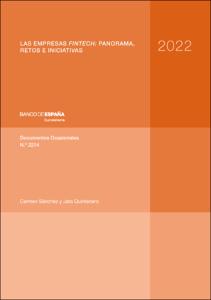Las empresas fintech: panorama, retos e iniciativas
Authors
Issue Date
29-Jun-2022
Physical description
27 p.
Abstract
La aplicación de las tecnologías en áreas como la computación en la nube, la blockchain y el big data, trasladadas a las finanzas, además de generar nuevos modelos de negocio, aplicaciones, productos y servicios con efecto material en los mercados financieros o en las instituciones que los conforman, puede facilitar el acceso a los servicios financieros y mejorar la eficiencia del sector. Muchas de estas soluciones son desarrolladas por empresas especializadas en el uso de las nuevas tecnologías en las finanzas, más conocidas como fintech, así como por grandes compañías tecnológicas o bigtech, aunque en este documento nos centraremos en las primeras. Desde 2010, las fintech han proliferado, enfocándose a menudo en segmentos específicos del mercado, como los de pagos, crédito o gestión de patrimonios, y transformando el ecosistema financiero en muchas jurisdicciones. Por el momento, el sector fintech presenta una dimensión muy reducida en comparación con el tamaño del conjunto del sector financiero. No obstante, el alcance simultáneo en varias actividades de la cadena de valor del sistema financiero, el elevado ritmo de crecimiento y la globalización (las fintech se encuentran en casi todas las jurisdicciones, y las grandes tecnológicas o bigtech tienen presencia global) aconsejan un seguimiento continuo. Sin embargo, se trata de una tarea ardua, debido a la falta de información estadística adecuada y armonizada sobre fintech. Por ello, en el siguiente trabajo se han revisado diversas fuentes de datos para dar una visión general del panorama fintech en las economías mundiales, para después centrar el foco en aquellas que operan en España y, seguidamente, repasar algunas iniciativas que se están llevando a cabo para abordar los retos a los que se enfrentan los reguladores.
In addition to generating new business models, applications, products and services with a material effect on financial markets and the institutions that comprise them, the application of technology to finance in areas such as cloud computing, blockchain and big data can improve access to financial services and enhance the sector’s efficiency. Many of these solutions are developed by companies specialising in the use of new technologies in finance (better known as fintech firms) and by large technological corporations (bigtech firms). Yet, this paper focuses only on the former. The number of fintech firms has grown significantly since 2010, often targeting specific market segments, such as payment, credit or wealth management. This circumstance has triggered the transformation of the financial ecosystem in many jurisdictions. For the time being, the scale of the fintech sector is small compared with the size of the entire financial sector. However, both the fact that these players are simultaneously covering several activities in the financial system’s value chain and exhibiting a rapid pace of growth, and globalisation (as fintech firms are found across almost all jurisdictions and bigtech firms have a global presence) call for its continuous monitoring. This is certainly a daunting task owing to the lack of appropriate and harmonised statistical information on fintech. Against this backdrop, this paper reviews several data sources in order to provide an overview of the fintech outlook across different jurisdictions. It then zooms in on those firms operating in Spain and examines some of the initiatives under way to address the challenges for regulators.
In addition to generating new business models, applications, products and services with a material effect on financial markets and the institutions that comprise them, the application of technology to finance in areas such as cloud computing, blockchain and big data can improve access to financial services and enhance the sector’s efficiency. Many of these solutions are developed by companies specialising in the use of new technologies in finance (better known as fintech firms) and by large technological corporations (bigtech firms). Yet, this paper focuses only on the former. The number of fintech firms has grown significantly since 2010, often targeting specific market segments, such as payment, credit or wealth management. This circumstance has triggered the transformation of the financial ecosystem in many jurisdictions. For the time being, the scale of the fintech sector is small compared with the size of the entire financial sector. However, both the fact that these players are simultaneously covering several activities in the financial system’s value chain and exhibiting a rapid pace of growth, and globalisation (as fintech firms are found across almost all jurisdictions and bigtech firms have a global presence) call for its continuous monitoring. This is certainly a daunting task owing to the lack of appropriate and harmonised statistical information on fintech. Against this backdrop, this paper reviews several data sources in order to provide an overview of the fintech outlook across different jurisdictions. It then zooms in on those firms operating in Spain and examines some of the initiatives under way to address the challenges for regulators.
Publish on
Documentos Ocasionales / Banco de España, 2214
Subjects
Clasificación sectorial; Innovación financiera; Empresas fintech; Startups; Sectoral classification; Financial innovation; Fintech firms; Startups; Regulación y supervisión de instituciones financieras; Evolución y desarrollo económicos; Instituciones financieras no bancarias; España
Appears in Collections:












